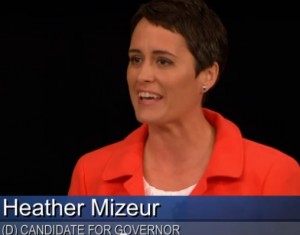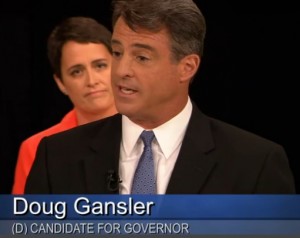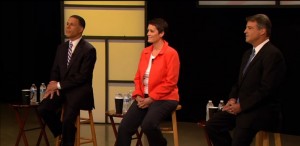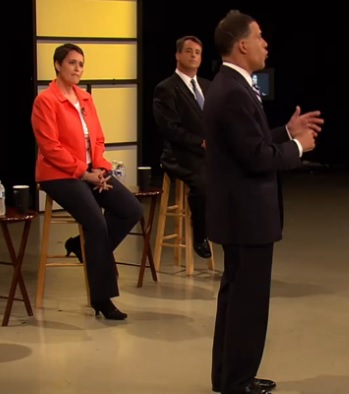Most are impressed with Mizeur in final TV debate for Dems
The debate can be watched online.
Rick Vatz, professor of rhetoric, Towson University: (ADDED 6/3, 11 p.m.)
As in his ads, Lieut. Gov. Brown mostly says what outcomes he wants for Maryland, not how he can effect them. Del. Mizeur talks about raising the minimum wage but has no interest in speculating what the economic consequences will be. Again, no one asks any candidate if or how he/she is going to reduce spending. Terrence Smith asks a softball question regarding what would be the first initiative for each candidate. Atty. Gen. Gansler at least talks about small businesses and the need to keep them in Maryland.
If anyone can discern Brown’s role in the health care rollout, he or she is a better observer than I. His answer is completely general and muddled, with no specific acceptance of accountability.
Del. Mizeur finds government subsidizing the answer to all educational problems, without any evidence to support her anticipation of causal change. Pre-K — no one even hints at looking at the problems caused by the children without fathers that makes this the go-to false-hope solution for kids who need to catch up.
Anyone can support spending more money without alluding to the fiscal consequences, such as job loss and wealthy people and corporations’ leaving Maryland. Want four more years of irresponsible government? Nominate Brown or Mizeur, per the debates. One caveat: Del. Mizeur says she is appalled by gerrymandering and want to have non-partisan Marylanders look into it. Good for her. But in her utterly unquestioned millionaires’ soak-the-rich tax, she presents no evidence that it would be a significant revenue builder or that the negative consequences of losing such citizens would not occur. On legalizing marijuana, Mizeur never references social costs, nor is she asked about them. Brown, to his credit, opposes it.
Want a Democrat who has at least some sense of fiscal responsibility per the debates? Nominate Gansler. Only he wants to lower taxes on businesses and is concerned about all small businesses. He is also generally more responsible, as on the issue of legalizing marijuana.
None of the candidates confronts serious challenges, either because they avoid them or because they are not posed. In sheer debating assessment terms, Gansler wins hands-down. He is more prepared, more substantive and more responsive to the questions, almost all of them.
If effervescence is your measure, Brown is your man. He is undaunted by his own inconsistencies and lack of direct responses to the questions.
From Jade Walker: Tonight’s debate seemed very promising for Heather Mizeur especially in the final hour. I must admit I am hopeful to see her last due to the fact it seems candidates have to align with their respective Democratic or Republican party before even approaching issues, especially matters American citizens are at a relative agreement in consensus. I am not sure about Gansler as he seems to be selling me the idea he is a moderate Republican with his tax initiatives. I feel he attacks Brown because Mizeur is an assumed long-shot; I wonder if she is remaining [in the race], will he begin to attack her? The constant banter about who knows what the Maryland people want or don’t want really echoes the current condition of Congress and the House as they refuse to do their jobs at a wide inability to compromise. IT IS AN EXTREME TURN OFF.
Brian Griffiths, Red Maryland, A Mizeur Win: This Democratic debate reminded me of most other Democratic debates during this election cycle because once again Anthony Brown and Doug Gansler took pot shots at each other while Heather Mizeur was the only adult in the room. Gansler’s performance was notably poor, as he often tripped over his words. Brown was no better, as he failed to make a coherent argument as to why he was any more electable than his opponents despite the natural advantage of de facto incumbency. Delegate Mizeur once again stayed positive and stuck to her issues, no matter how far to the left of mainstream Marylanders those views really are.
 If I were to declare a winner, it would be Mizeur. Despite the polling and fundraising numbers, it still may be her race to lose as I said back in April,
If I were to declare a winner, it would be Mizeur. Despite the polling and fundraising numbers, it still may be her race to lose as I said back in April,
Jeremy Bauer-Wolf, MarylandReporter.com: This debate was the last on television for the Democratic gubernatorial hopefuls before the primary, and overall a stronger showing. At least all three were present.
No surprises, no gaffes, simply sound bites and commitments to the issues each considers a priority, which at least for Attorney General Doug Gansler seems to still be attacking Lt. Gov. Anthony Brown.
In a debate absolutely strapped for time toward the end, Gansler took his closing 40 seconds to sucker punch Brown, perhaps a wise tactic considering Brown’s acknowledged lead in the polls.
Gansler was the most coherent he’s been in all three of the TV debates, rattling off his tax plan and term accomplishments, still delivering jabs to Brown but not coming off nearly as childish as the first debate.
Del. Heather Mizeur also stood unwaveringly by her progressive agenda: marijuana legalization, with the revenue to be funneled to expansion of pre-kindergarten education; expanded health care with an emphasis on catering to minorities. But with only mild bickering between Gansler and Brown, her position as the positive, grassroots Hail Mary was weakened. She presented herself well enough and executed her explanation of the important issues warmly and directly, but perhaps not enough to convince the swath of yet undecided voters composing the audience.
 Only Brown seemed off his game, a little hesitant and vague at times, and ultimately failing to address head on the failure and his role in the Health Care Exchange roll out — a specific question from the moderator. Only a radio debate separates the trio from June 24, and besides the inevitable ad blitz to come, it’s certainly not set whether the performances of Gansler and Mizeur are enough to sway voters from the momentum of the Brown campaign.
Only Brown seemed off his game, a little hesitant and vague at times, and ultimately failing to address head on the failure and his role in the Health Care Exchange roll out — a specific question from the moderator. Only a radio debate separates the trio from June 24, and besides the inevitable ad blitz to come, it’s certainly not set whether the performances of Gansler and Mizeur are enough to sway voters from the momentum of the Brown campaign.
Melissa Bolling, Laurel: This being the first debate I’ve purposely viewed, I found it interesting and informative. Overall they all made some strong points regarding their focus and priorities once in office, however I was more compelled towards Delegate Mizeur, not only because she has the first publicly funded campaign in 20 years, but because her focus seems to truly be about the people and their best interest, which after all is the purpose of an elected official.
Len Lazarick, MarylandReporter.com:
Congratulations to Jeff Salkin and Maryland Public TV for a simple set and open format. I don’t know about the “undecided voters” in the audience put together by the League of Women Voters — I counted at least seven out of about 50 or so who I knew from the League or Democratic politics.
Gansler must attack and undermine Brown, but the pugnacity comes at a cost to his likeability.
Under prodding from Salkin — reading a direct question from a Baltimore Sun editorial — Brown gave his longest and most elaborate response to his responsibility for the Health Benefit Exchange fiasco. It was a complicated answer that deflected responsibility for the bad parts while accepting responsibility for the good parts of the Affordable Care Act.
An audience member asked about the Bay and particularly the role of the other states that contribute to Bay pollution. All three candidates largely ignored the role of other states to the Bay’s problems and what Maryland might do about it.
One real surprise and piece of news: Brown said the estate tax cut passed this session, and signed by the governor, “would never have made it to my desk.” Instead he would have favored comprehensive tax reform. Did he actually disagree with Gov. Martin O’Malley on something?
I would have to agree with others that Mizeur came off the best; friendly and warm to match her orangey red blazer; direct and articulate, a consistent and comprehensive plan to tax millionaires and corporations to fund her priorities, while giving tax breaks to middle class and small business — and legalizing, regulating and taxing marijuana. If more people watched debates, she’d be further ahead in the polls. She must figure out how to translate the positive vibes from the debates to mass appeal.
Todd Eberly, political science professor, St. Mary’s College of Maryland:
Let me start by sending my sympathies to all of the undecided Democratic primary voters who had tuned into this debate hoping to make a decision. In the final televised Democratic debate before the primary, each of the candidates turned in a strong performance.
As the Democratic contest truly got underway in the past few months each candidate was dogged by a possibly defining question. I’ll consider each in turn.
Del. Heather Mizeur faced the question of whether or not she was a “serious” or credible candidate. Early in the race, many reporters treated her as a fringe candidate with little hope of winning. Over the course of these debates, Mizeur effectively and completely eliminated any doubts regarding her seriousness and credibility.
Mizeur impressive
She refused to engage in the negative tactics employed by her opponents and she refused to apologize for her decidedly progressive policy beliefs. Mizeur demonstrated that she has been a very active and effective legislator, even emphasizing her ability to construct bipartisan deals on contentious issues – in a state where there’s often little need for bipartisan deals. Her decision to accept public financing and her vocal support for redistricting reform signaled an intent to reform the Maryland Democratic party from within.
In tonight’s debate, she continued her string of impressive performances. From marijuana legalization to universal pre-K to a millionaire’s tax, Mizeur offered voters a vision of Maryland that was actually liberal as its reputation. It remains to be seen if she will win the primary, but she has clearly demonstrated that her departure from the House of Delegates will be a loss for her district and the state.
Gansler’s disciplined campaign
Attorney General Doug Gansler was once considered to be the frontrunner in this race, but that was before the race began, before Brown secured the support of the Democratic Party establishment, and before revelations about troopers running red lights and drunken teen beach parties. By October of last year the question dogging Gansler was whether or not he was capable of running a disciplined campaign.
The Maryland Health Care Exchange failure provided Gansler with the opening he needed. He found his voice and his message. At the first debate he hammered away at Brown’s failed management of the health exchange and questioned his preparedness to lead the state. Brown went after Gansler with a few prepared attack lines on the death penalty and the beach party, but Gansler effectively turned away each attack.
In tonight’s debate, Gansler answered definitively that he can run a disciplined campaign. He used Brown’s establishment endorsements to suggest that the Lt. Governor had been “bought” by special interests. He offered a compelling general election argument that Maryland taxes were too high and job opportunities were too few. And while Mizeur and Brown tried to out-promise one another on universal pre-K, Gansler was the one who pointed out that programs cost money and Maryland doesn’t have any to spare. Gansler missed no opportunity to point out actions he took as attorney general regarding sex offenders, the health of the Chesapeake Bay, and the Affordable Care Act, that prepared him for the job of governor. It was a strong closing argument.
Brown dispels doubts
Lt. Governor Anthony Brown once seemed unstoppable. As the 2014 election season started Brown was riding a wave of endorsements and had scored a major coup in securing Howard County Executive Ken Ulman as a running mate. Then came the Health Exchange fiasco in October and the once well-oiled Brown machine veered off track. Brown suffered through a series of less than stellar appearances at hearings in the House and Senate where he refused to accept responsibility and refused to apologize for the failure. Matters became worse for Brown as he refused to offer any significant details regarding his policy priorities should he win.
In spite of an impressive resume, critics began to openly refer to Brown as an “empty suit.” Brown failed to impress in his first debate performance and then skipped the 2nd televised debate in Baltimore. This fueled suggestions that his campaign was either worried he’d make a major mistake OR that Brown was taking Baltimore for granted.
In tonight’s debate Brown dispelled any notions of his being an empty suit. Though he meandered a bit on the first question regarding his electability, he recovered quickly and his answers got stronger as the debate progressed. He offered a compelling case that Virginia is NOT cleaning Maryland’s clock when it comes to job creation. He framed Gansler’s proposal to cut the corporate tax rate as a choice between a tax giveaway to big corporations OR having the funds for universal pre-K. On taxes, Brown offered his first “break” with O’Malley declaring that he never would have allowed the recently enacted estate tax cut to reach his desk. Was he perfect? No, but he didn’t need to be.
It was a good night for Brown and his performance left me wondering why he decided to skip the 2nd debate. I think back-to-back performances like tonight would have sealed the deal for Brown. Instead, he simply stopped any minor bleeding that the skipped debate may have caused.
Battled to a draw
I believe Gansler won the first debate, Mizeur laid claim to the second, and in tonight’s debate the candidates battled to a draw. As the frontrunner, Brown will benefit the most from the tie and from the fact that this, the final debate, was his strongest.
But each of the candidates came out ahead. If undecided voters worried that Brown was an empty suit, they now know otherwise. If they thought Mizeur was a fringe candidate and unprepared for the job, they now know otherwise. If they thought Gansler was an undisciplined frat boy, they now know otherwise. On June 24, Democratic primary voters will have to choose between three very qualified and very (politically) attractive candidates. What a rarity that is in American politics.
Glynis Kazanjian, MarylandReporter.com:
Undecided voters who attended or watched the Maryland Public Television Democratic gubernatorial debate may be hard pressed to pick a candidate by the end of the debate – they were all good.
All three candidates – Lt. Gov. Anthony Brown, Attorney General Douglas Gansler and Del. Heather Mizeur — were crisp, well-spoken and focused.
Lt. Gov. Brown answered some of his earlier criticisms by coming to this debate with thoughtful, detailed plans of what a Brown-Ulman Administration would look like.
All three candidates chose job creation as among their top priorities, but just how they create those jobs – or how viable their plans are – should be tested, in theory at least, before the June 24 primary.
Mizeur plans to fund many of her initiatives with revenues from the legalization of marijuana, but what if the state legislature doesn’t pass it. Brown and Gansler deserve credit for their prudent approach to study two states that have, before deciding if the decision is best for Maryland.
Finally, a debate moderator asked the question that anyone following politics wants to know – what really was Anthony Brown’s role in the failed and costly implementation of the state health exchange?
Brown was the top elected official charged with delivering the state’s new health care exchange – he even penned some two or three dozen press releases prior to the exchange’s opening gloating about how great it was going to be.
Saying he should have been appointed to a lower position on the Health Benefit Exchange instead of being named the chair of the Health Care Reform Coordinating Council, was simply unsatisfactory. I’m sure audience members who understood the issue were not impressed with that answer.
Of the three candidates, Gansler seems to be the most fiscally responsible, but he may face the same problem as Mizeur – electability.
The debate is worth watching if you haven’t seen it, especially if you are undecided.
Besides clear messages from each of the candidates on most major issues, Mizeur finally takes the gloves off by accusing the administration of fudging waitlist numbers for pre-k subsidies while Gansler clears up attack ads in Brown’s campaign mailers.
The quote of the night belongs to Gansler when asked if Maryland taxes were too high – “Of course the taxes are too high!”
And for some real nay-saying about the debate, here are Jud Malone’s comments on Facebook:
Just watched Maryland Public Television gubernatorial debate amongst the democrat candidates. What an incredible waste of time. Dancing with the stars is more informative. In fact the next program was the Big Band Years. What a way to numb the mind.

MarylandReporter.com is a daily news website produced by journalists committed to making state government as open, transparent, accountable and responsive as possible – in deed, not just in promise. We believe the people who pay for this government are entitled to have their money spent in an efficient and effective way, and that they are entitled to keep as much of their hard-earned dollars as they possibly can.


